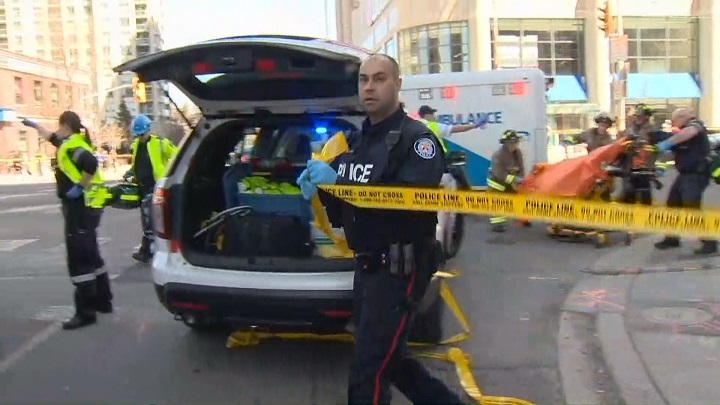Causing terror does not make an attack terrorism.

In the aftermath of a horrific van attack that killed 10 and injured 14 on the streets of northern Toronto, that may be a contentious point to make — but it’s one experts say is critical.
A now-deleted Facebook post appears to link suspect Alek Minassian with the misogynistic “incel” movement, but experts aren’t sure this connection with an online, alt-right, subculture group puts the attack within the modern definition of terrorism.
From the 2014 attack on Parliament Hill and the 2017 U-Haul rampage in Edmonton to the 2017 Quebec City mosque shooting and the tragedy earlier this week in North York, one of the first questions to emerge after an attack is whether it was an act of terrorism.
READ MORE: What we learned from Alek Minassian’s Incel-linked Facebook page – and what we’d like to know
While terror is often a byproduct of such violence, actually making the decision to call something terrorism comes down to a much broader set of factors that must be considered.
“The thing that really differentiates an act of terrorism from other kinds of violent actions is it’s done quite clearly for some kind of political, religious, or ideological reason,” said Lorne Dawson, co-chair of the Canadian Network for Research on Terrorism, Security and Society.
“It’s the tie-in to some kind of ideology that’s crucial.”
WATCH BELOW: Toronto van attack suspect linked to misogynistic “incel” movement

In the past, attacks that officials have deemed to be acts of terrorism have frequently been those committed by Islamist extremists, such as the 2001 9/11 attack, the 2009 Fort Hood shooting and the 2013 Boston Marathon bombing.
READ MORE: America since 9/11: timeline of attacks linked to the ‘war on terror’

Get daily National news
The common thread, Dawson says, is the perpetrators have had clear and/or declared links to organized terrorist groups, such as al-Qaeda or more recently, ISIS.
The van attack suspect does appear to have published his praise of the “incels” on Facebook shortly before the attack took place. Some on Twitter have raised questions about why the attack is not being called an act of terrorism and whether associating with internet subcultures should count as an ideology.

- Canadians involved in tourist bus crash in Dominican Republic, embassy says
- Canadians stuck in Middle East say cities ‘very tense’ as Iran conflict escalates
- Alberta mulls ditching time switch — again — as B.C. moves to permanent daylight
- As oil and gas prices rise amid Iran conflict, what comes next?
As outlined by Carleton University national security expert Stephanie Carvin in a recent column in the Globe and Mail, legal definitions for what constitutes terrorism are largely based around the understanding of terror as a political tool used by organized groups to achieve a specific goal.
However, the rise of the alt-right and associated violent sub-cultures are presenting a growing challenge.
READ MORE: So-called ‘incels’ celebrate Toronto van attack, praise alleged driver Alek Minassian
“When an act is carried out in the name of a listed terrorist entity – such as al-Qaeda or the Islamic State (IS) – prosecutors can easily point to a coherent set of ideas upon which a terrorism charge can be laid,” Carvin noted in the column.
“However, when it comes to fringe movements and broad anti-government ideologies, prosecution becomes trickier.”
WATCH BELOW: Canadian politicians urged to keep distance from ‘Alt-Right’

Terrorism as a concept dates as far back as ancient times, but the modern understanding of the term came about in the 19th and early 20th centuries as it became more frequently employed as a tool by anarchist and anti-government groups in Europe.
Since then, it has evolved to carry strict legal definitions in contemporary law.
Under the Canadian Criminal Code, terrorism is defined as an act committed in whole or in part for a political, religious or ideological purpose, objective or cause, and that is done with the intent of intimidating the public or a segment of the public or compelling someone to do or refrain from doing something.
Put simply, terrorism is an act that uses the creation of terror as a means to bring about an end goal identified under the ideology that inspired the attacker.
When a clear end goal is not known, it is not possible to accurately describe something as terrorism.
WATCH BELOW: Bissonnette spent hours on far-right websites

Defining what constitutes an identifiable ideology under the legal definition of terrorism often boils down to where an act fits along a continuum of factors that need to be considered, Dawson says.
He noted while the suspect in the van attack appears to be linked to a subculture of the alt-right, the lack of connection to any established group or organized movement with a stated agenda makes it “questionable” to suggest such a reported point of view could be considered an actual ideology.
“It’s more an expression of grievance on the part of some group in society. It’s an expression of grievance, of anger, of animosity but it’s not necessarily a full-scale ideology.”
Public Safety Minister Ralph Goodale and Prime Minister Justin Trudeau have said that based on the evidence they have now, “there’s no national security threat” posed by the attack.
As the investigation into the tragedy continues, more information is expected to come out that could reveal more details about the motivations behind the suspect.
For now, though, officials and experts seem to agree there is no evidence that the attack meets the legal definition of terrorism, despite the feelings of terror it may have caused — but what to do about how to meet the challenges posed by violence in the alt-right remains an open question.








Comments
Want to discuss? Please read our Commenting Policy first.